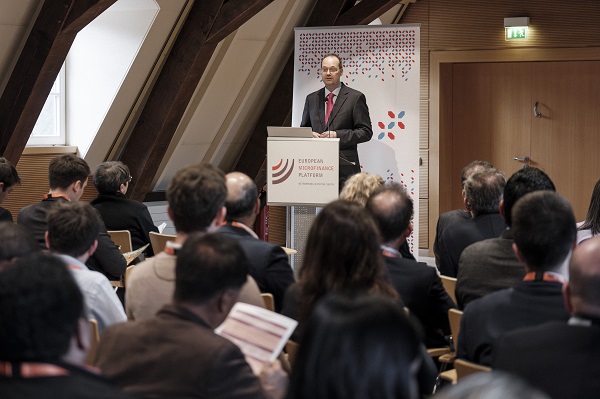 Christoph Pausch, e-MFP Executive Secretary, at EMW 2023;
Credit: e-MFP
Christoph Pausch, e-MFP Executive Secretary, at EMW 2023;
Credit: e-MFP
The European Microfinance Week (EMW), hosted by the Luxembourg-based European Microfinance Platform (e-MFP), is returning to the Abbaye de Neumünster in Luxembourg-Grund this week, from Wednesday 13 to Friday 15 November 2024; several online sessions will also be available.
More than 30 conference sessions (in English) on a range of topics are on the agenda. The topic of the 2024 European Microfinance Award is "Advancing Financial Inclusion for Refugees & Forcibly Displaced People". Details about EMW 2024 (including the programme and registration) are available at https://www.emw2024.eu
Chronicle.lu had the opportunity to speak with Christoph Pausch, Executive Secretary of e-MFP, to learn more about EMW 2024 and this year's award.
Chronicle.lu: Why is the topic of this year's European Microfinance Award important/relevant at present, particularly at a time of geopolitical (and other) uncertainty?
Christoph Pausch: The European Microfinance Award is a prestigious annual €100,000 award, given by the Luxembourg Ministry of Foreign and European Affairs, Defence, Development Cooperation and Foreign Trade (MFA), and is jointly organised by the MFA, e-MFP and InFiNe. The 2024 edition focuses on "Advancing Financial Inclusion for Refugees & Forcibly Displaced People" and e-MFP has just published a report* which gathers the lessons and best practices revealed by the Award applicants.
The paper highlights that displacement is at its highest level ever - and will only increase further in light of growing global uncertainty and the proliferating drivers. It is also more protracted and complex in nature, often involving multiple movements both internal and external to the country of origin, and will more and more be driven by climate change, which of course, is inherently regressive; poorer countries and poorer people bear the biggest climate impact burdens: developing countries which have contributed the least to emissions typically suffer the greatest climate disruptions, with the poorest the most vulnerable to displacement. So, it's obvious that this is a topic of enormous and growing importance, and as the paper makes clear, there is a vital role being played by financial inclusion organisations.
Chronicle.lu: The European Commission reported that the number of forcibly displaced people (FDPs) in the world reached 120 million as of May 2024… How can financial inclusion support these already vulnerable groups?
Christoph Pausch: The financial inclusion sector generally serves and seeks to support those people living in countries where displacement is more common and where its drivers are clearer. Effective financial inclusion of FDPs can support immediate displacement needs and foster long-term self-reliance and resilience. It can play a vital role in restoring decent livelihoods, contributing to local economies and facilitating return or resettlement. But it must also recognise the unique needs and vulnerabilities of FDPs, which will depend on many contextual factors, including the "phase" of displacement - all the way from recent arrival to permanence, and how this translates to needs from cash services, to remittances, insurance, or housing finance, and non-financial services like language or legal support.
Chronicle.lu: Please tell us about some of the main challenges facing refugees and forcibly displaced people in terms of access to financial services.
Christoph Pausch: As the paper makes clear in rich detail, these barriers are varied and complex and require solutions that are carefully matched to the challenges. Nevertheless, there are probably four main categories of barrier FDPs face when interacting with financial providers and the financial system. These are: "Familiarity" barriers (that come with not knowing the local language or practices, or the different services available); "Newcomer" barriers that come with being a recent arrival, such as the lack of a financial track record, viable loan collateral or other financial resources; "Legal" barriers, such as the absence of legal status or lack of appropriate identification to meet KYC (Know Your Customer) requirements; and "Cultural/political" barriers that come from host communities viewing arrivals with suspicion or bias. Of course, there are also abundant challenges that providers themselves face when seeking to serve FDPs.
Chronicle.lu: Concretely, how might some of the projects awarded (or put forward) this year help refugees and forcibly displaced people "build resilience, restore livelihoods and live with dignity in host communities"?
Christoph Pausch: There were 49 original applicants for the Award from 26 countries which was reduced to ten semi-finalists and among them three finalists. So clearly there was a great variety in the type of organisation but also the nature of their intervention or initiative. The ten semi-finalists are the ones profiled in the publication, so while they're a smaller number of the overall field, even so they reveal a real breadth of interventions and lessons learned. Broadly speaking, they're put into three main categories of intervention: 1. Designing and delivering services for FDPs. This includes both financial products designed specifically for FDPs, as well as those adapted to a displacement context, and the complementary non-financial services that FDPs need; 2. Adapting operations and strategy. This includes human resources, other operational innovations or investments, and embedding a focus on FDPs in the institutional strategy; and 3. Changing the context. This includes outreach to, and sensitisation of, host communities, and lobbying or advocacy to create a more conducive policy environment for serving FDPs.
Also new this year in the publication is a section entitled "Organisations' own lessons learned" - what the applicants themselves have learned (in their own voice) over the course of their work serving FDPs. And then as always it concludes with some "insights" from the e-MFP Award team, on what they consider to be the best practice that can be emulated by other organisations.
I know the e-MFP Award team has found this a particularly worthwhile Award process, and now our hope is that, even after the winner is announced during e-MFP's annual conference EMW2024, that the insights from this Award can endure and be of real use to others in the sector.
* The report mentioned in this interview is available here.








